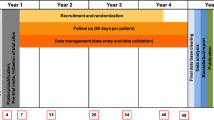Abstract
Purpose
The adequate perioperative antibiotic prophylaxis in maxillofacial surgery is still under discussion due to the wide range of hard and soft tissue procedures as well as contaminated, semi-contaminated and clean surgical sides. Perioperative antibiosis is an easy applicable tool that can be used to decrease nosocomial morbidity and mortality by reducing the rate of infections. We compared strictly perioperative antibiosis with an extended postoperative prophylactic antibiosis.
Materials and methods
In this study, 901 consecutive patients, from a tertiary care maxillofacial surgery department were included and distributed into two groups: The first group received peri- and postoperative antibiotic prophylaxis (PP; n = 365) from the day of operation until the fifth day postoperatively. The second group was treated with single shot prophylaxis with intraoperative repetition as needed (SSP; n = 536) only. Furthermore, the patients were grouped according to their main diagnosis and surgical procedure. For comparison, general anamnestic data, cultured bacteria and resistances, number of surgical site infections and duration of hospitalization were compared.
Results
There were no statistically significant differences in general diseases or extent of surgery between the groups. There was no statistical difference in the surgical site infections between the groups regardless of their diagnosis. There were significant correlations between tracheotomised patients (p < 0.001) as well as patients with a higher BMI (p = 0.009) and the incidence of surgical site infections. Most common cultured bacteria were staphylococci.
Conclusion
Based on the findings of the study, we believe that a perioperative antibiosis delivers a sufficient prophylaxis for patients undergoing maxillofacial surgery procedures.
Similar content being viewed by others
References
Abele-Horn M. Perioperative antibiotikaprophylaxe. AWMF: AWM; 2012. http://www.awmf.org/leitlinien/detail/ll/029-022.html
Ariyan S, Martin J, Lal A, Cheng D, Borah GL, Chung KC, Conly J, Havlik R, Lee WPA, McGrath MH, Pribaz J, Young VL. Antibiotic prophylaxis for preventing surgical-site infection in plastic surgery: an evidence-based consensus conference statement from the american association of plastic surgeons. Plast Reconstr Surg. 2015;135:1723–39.
Brooke SM, Goyal N, Michelotti BF, Guedez HM, Fedok FG, Mackay DR, Samson TD. A multidisciplinary evaluation of prescribing practices for prophylactic antibiotics in operative and nonoperative facial fractures. J Craniofac Surg. 2015;26(8):2299–303.
Chaukar DA, Deshmukh AD, Majeed T, Chaturvedi P, Pai P, D’Cruz AK. Factors affecting wound complications in head and neck surgery: a prospective study. Indian J Med Paediatr Oncol. 2013;34:247–51.
Fuentes E, Fuentes M, Alarcon M, Palomo I. Immune system dysfunction in the elderly. An Acad Bras Cienc. 2017;89:285–99.
Halle M, Eriksson BO, Docherty Skogh AC, Sommar P, Hammarstedt L, Gahm C. Improved head and neck free flap outcome-effects of a treatment protocol adjustment from pre- to postoperative radiotherapy. Plast Reconstr Surg Glob Open. 2017;5:e1253.
Huang W, Lynham A, Wullschleger M. Orbitozygomatic fracture repairs: are antibiotics necessary? Craniomaxillofac Trauma Reconstr. 2015;8:271–6.
Khan FY, Elzouki A-N. Clostridium difficile infection: a review of the literature. Asian Pac J Trop Med. 2014;7S1:S6–13.
Khan MN, Russo J, Spivack J, Pool C, Likhterov I, Teng M, Genden EM and Miles BA. Association of body mass index with infectious complications in free tissue transfer for head and neck reconstructive surgery. JAMA Otolaryngol Head Neck Surg. 2017;143(6):574–579.
Kreutzer K, Storck K and Weitz J. Current evidence regarding prophylactic antibiotics in head and neck and maxillofacial surgery. BioMed Res Int. 2014;2014. https://www.hindawi.com/journals/bmri/2014/879437/
Kruse AL, Luebbers HT, Gratz KW, Obwegeser JA. Factors influencing survival of free-flap in reconstruction for cancer of the head and neck: a literature review. Microsurgery. 2010;30:242–8.
Langerman A, Thisted R, Hohmann S, Howell M. Antibiotic and duration of perioperative prophylaxis predicts surgical site infection in head and neck surgery. Otolaryngol Head Neck Surg. 2016;154:1054–63.
Lovato C, Wagner JD. Infection rates following perioperative prophylactic antibiotics versus postoperative extended regimen prophylactic antibiotics in surgical management of mandibular fractures. J Oral Maxillofac Surg. 2009;67:827–32.
Marimuthu C, Abraham VT, Ravichandran M, Achimuthu R. Antimicrobial prophylaxis in instrumented spinal fusion surgery: a comparative analysis of 24- and 72-h dosages. Asian Spine J. 2016;10:1018–22.
McDevitt J, Cancela Mde C, Kelly M, Comber H, Sharp L. Tracheostomy and infection prolong length of stay in hospital after surgery for head and neck cancer: a population based study. Oral Surg Oral Med Oral Pathol Oral Radiol. 2016;121(22–28):e1.
Nelson RL, Gladman E, Barbateskovic M. Antimicrobial prophylaxis for colorectal surgery. Cochrane Database of Syst Rev. 2014. https://doi.org/10.1002/14651858.CD001181.pub4
Nelson RL, Glenny AM, Song F. Antimicrobial prophylaxis for colorectal surgery. The Cochrane Database of Syst Rev. 2009. https://doi.org/10.1002/14651858.CD001181.pub3
Richardson WL, Hammert WC. Adverse effects of common oral antibiotics. J Hand Surg. 2014;39:989–91.
Valdez TA, Marvin K, Bennett NJ, Lerer T, Nolder AR, Buchinsky FJ. Current trends in perioperative antibiotic use: a survey of otolaryngologists. Otolaryngol Head Neck Surg. 2015;152:63–6.
Vila PM, Zenga J, Jackson RS. Antibiotic prophylaxis in clean-contaminated head and neck surgery: a systematic review and meta-analysis. Otolaryngol Head Neck Surg. 2017;157(4):580–588.
Author information
Authors and Affiliations
Corresponding author
Ethics declarations
Conflict of interest
All the authors declare no conflicts of interests.
Rights and permissions
About this article
Cite this article
Bartella, A.K., Lemmen, S., Burnic, A. et al. Influence of a strictly perioperative antibiotic prophylaxis vs a prolonged postoperative prophylaxis on surgical site infections in maxillofacial surgery. Infection 46, 225–230 (2018). https://doi.org/10.1007/s15010-017-1110-4
Received:
Accepted:
Published:
Issue Date:
DOI: https://doi.org/10.1007/s15010-017-1110-4




